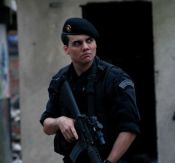
Jose Padhila on accepting his Golden Bear in Berlin.
The problems of crime in Rio are well-documented – and recently they've been well filmed, too. From City Of God's exploration of the violence in the slum area favelas to documentary Manda Bala, which suggested that street crime was linked to higher political corruption. The endemic nature of crime – particularly in relation to police corruption and middle-class indifference – is a subject dear to director Jose Padilha's heart. So much so that he has dedicated a trilogy of films to the examination of it, starting with documentary Bus 174 – which details a hijack that turned into a media circus – and continuing with Elite Squad, which won top honours at this year's Berlin Film Festival.
It, too, was originally conceived as a documentary – this time focusing on police corruption and violence – but it soon became apparent to Padilha that he would have to set his film in a fictional world.
"First of all," he says, "I'm here. If I had tried to do a documentary, tried to actually capture it, I probably wouldn't be able to." It seems an incongruous statement, coming from a man looking calm and relaxed before a screening of his film at the Edinburgh International Film Festival. But dealing in documentaries is a risky business in Brazil.
"I tried for two days and I realised that no cop was going to let me go in while they do what they do – because they are killing and torturing people in the favelas, the slums," he says. "So very quickly I realised that if I wanted to tell the story visually, not only verbally, I would have to make it as a fictional movie."
The film charts the story of the captain of the elite BOPE special operations force, Captain Nascimento (Wagner Moura), who after years of fighting the war in the favelas – with all its attendant violence – is seeking a replacement. Running parallel to his story of escape is the tale of two new recruits, Neto (Caio Junqueira) and Matias (Andre Ramiro), who are as desperate to break into the squad as he is to break out. But as they fight crime they also find they have an ever-bigger fight on their hands to avoid compromising their ideals.
Despite Elite Squad having a fictional narrative, Padilha is at pains to point out that it is rooted in fact.
 "Even though fictionally you have more freedom, I kept the movie grounded in reality. Many of the characters in the movie are real. The Matias character – the guy who goes to college and is a cop at the same time – is inspired by a real cop who did that. Nasciemiento is inspired by my co-writer, Rodrigo Pimental, who wrote the script.
"Even though fictionally you have more freedom, I kept the movie grounded in reality. Many of the characters in the movie are real. The Matias character – the guy who goes to college and is a cop at the same time – is inspired by a real cop who did that. Nasciemiento is inspired by my co-writer, Rodrigo Pimental, who wrote the script.
"I did two years of research, I interviewed 20 cops, I interviewed psychiatrists from the police, trying to understand. And I wrote the movie with a cop, trying to present the reality of violence in Rio, through the perspective of a violent cop, which is the basic premise of this film. So, yes, it gives you freedom but I didn't use that freedom to change reality."
Part of the way Padilha hooks into reality is by setting the film against the backdrop of a visit to the city by Pope John Paul II.
"I wanted to tell everyone that this is what is going on, but it's absurd – it's ridiculous that we're doing this to ourselves. So I looked through the history of the Elite Squad and tried to find out the most crazy, preposterous operation they ever did, so I ran into the true story of the John Paul II operation, which took place in 1997.
"The whole thing is going on against the backdrop of that operation which basically was, the Pope is coming to Rio, the Pope wants to sleep close to a slum, at the bishop's house, the Pope is going to wake up to the sound of machine guns and we cannot let that happen – therefore let's go and raid the favela next to the place the Pope wants to sleep and kill the drug dealers there. People basically killed 35 people, so the Pope could sleep one night in Rio – it happened. So I set the whole film against the background of this absurd thing, so that people would know that everything was real but it was absurd."
Despite the absurdity of the supporting story, the reality of shooting the film was tough – so tough, in fact, that despite making the film a fictional one, shooting in the favelas was still a dangerous game. Junqueira has said: "We were always working on the edge of danger, dressed as cops inside the favelas."
 Padilha agrees, when asked whether he thought putting actors in that position was dangerous.
Padilha agrees, when asked whether he thought putting actors in that position was dangerous.
"Let me put it this way," he says "I wouldn't do it again. It was very, very risky. We had many incidents during the shooting of the movie of people in danger. I hadn't foreseen it as it was.
"I went to shoot in the same location where people shot City Of God and City Of Men had recently been shot in that same location, and I thought that we were going to be safe, but obviously we were doing something different and the reaction to us wasn't the same.
"We go in with a lot of lights and 200 people working for the movie, so they know there's a movie going on. But a drug dealer can put you at risk; the fact that the police could raid the location any time and there could be a shoot out – which actually happened – and someone could get killed."
Yet despite the large numbers of crew, the shoot still fell foul of local drug lords in an incident that almost shut the film down completely.
"The drug dealers didn't actually know what we were doing," he reveals. "But they saw as we were shooting the movie that we were showing cops killing and torturing and we were showing the corruption, and they kind of liked that.
"Nevertheless, as we were shooting the movie, the drug dealers hijacked four members of the crew with all the fake guns and that halted the movie for two weeks. We lost a million dollars, we almost killed the movie. The crew was released, they only wanted the weapons and the blanks, but it was very traumatic and my crew was fantastic for hanging on in there and going back to shooting again.
"It was very stressful. It's the first time in my life that I was without sleep for four days."
And it wasn't just the pressures of violence on the streets that Padilha faced. He also fought an uphill battle with the police, who were dead set against the film being made. Since it documents the extreme levels of violence the police will go to in order to maintain 'control' in the slum areas, they did everything they could to prevent the shoot going ahead.
"The screenplay of the movie was inspired by a book, written by a very famous Brazilian sociologist, Eduardo Soares, who used to be vice governor of Rio, and the cop who wrote the movie with me, Pimentel, and the other cop, Andre Batista, the one that inspired the Matias character. And the book was hated by the police.
"So when they heard about the film, they tried to prevent it from being made, so they wouldn't give us a permit to shoot in the locations we needed to shoot. They would ask for the screenplay and so on, so the initial reaction from the police was to censor the movie. We went to the governor of Rio, we explained by saying, 'You've got to choose, Governor, either you're going to have very bad publicity because we're going to come out and say there is censorship in this country, you are the one who manages the police who are trying to stop our movie – or, you let us shoot.' And the governor decided to let us shoot. It was the smart political decision to make, I think.
"We shot the movie, there was a pirate copy stolen – and the whole story about the piracy of the movie, which you know [astoundingly, thanks to someone pinching an early cut of the film, more than 11 million people saw it before it was even released in cinemas]. Then the Elite Squad officials got together and sued us, trying to prevent the movie opening the Rio de Janeiro Film Festival because they thought the movie was derogatory about their squad, as it showed them killing and slaughtering in the slums.
"We won the lawsuit. Then there was another lawsuit from them, trying to force us to edit out the torture and violent scenes. The judge ruled, 'Everybody knows that this is how it is. The movie stays and plays.'
"Finally, the police decided that I had to give up the names of the cops that helped me with the research, so they could be tried by the institution. By that time, the movie was very popular – seen by 20 million people – and I said, 'No, I'm not going to give the names out and that's it.'
"So the colonel said, 'I'm going to go and arrest you, in your house.' This was in the papers and then the governor stepped in and said, 'No arresting people, please.' He took the side of the movie and said, 'What the movie shows is real. We've got to change the way the police is.' I think it was a sincere thing, but it was so very popular it would have been a very bad thing for the governor if I was arrested. And that was the end of the police reaction to the movie."
Given the historical nature of the film, does Padilha think anything has changed during the past decade?
"Last year the police killed more than 1200 in Rio de Janeiro alone – those are the official numbers, real numbers must be much higher than that," he says "That's crazy. In the whole of the United States, which has 300 million inhabitants, every year the police kill around 200 people. In Rio de Janeiro alone, with 30 million inhabitants – 30 times less – we killed at least six times more. It's crazy.
"It's the way the police are managed in Brazil, the fact that they make very small wages, are very badly trained, very corrupted and some of them, a small number, are indoctrinated to be very violent. It's crazy. We are creating a police that breeds violence itself and we cannot solve the problem of violence in Rio without solving the problem of the police. We've got to fix the police."
In fact, it isn't just the police and the slums that Padilha believes need to be fixed, it's the whole of the society – particularly the attitudes of the middle-classes which Padilha asserts are fuelling the drugs at grass-roots level. He's happy to go on the record to say that although he himself doesn't use drugs he believes some of them, such as marijuana, should be legalised, adding, "It's a little bit like what we had in Chicago in the Thirties, when alcohol was illegal and we had gangsters killing each other. High rates of violence. Then alcohol became legal and rates of violence came down."
"Here's the thing," he adds, grimly. "Everyone agrees that if you buy products that are made out of wood from the Amazon Rainforest, you are financing the destruction of the rainforest. If you buy products made by child labour, you are financing businesses run on child labour.
"Well, low and behold, if you buy drugs in Brazil, you are financing those who sell. And who are they? They are heavily armed drug dealers who control, with a lot of violence, very poor communities. And the middle and upper class in Brazil is very critical of violence but many of their members do drugs, so there is a lot of hypocrisy going on. With intellectuals, too, people who write in newspapers and do a little drugs for fun, very critical of violence, but they are funding it and they are a part of it.
"What I don't see and what I would like to see is those who use drugs stand up and say, 'We are for the legalisation of drugs'. So what I see is hypocrisy. So, in my movie I choose to provoke these people by stating this is the case and by having a very violent cop state to make it even more aggressive towards their stance.
"And that kind of worked, we got a lot of debate going on in Brazil. Many of the liberals responded and said, 'This is a right-wing fascist movie' which I guess, in a way, is a way to dismiss the movie. You don't have to deal with it and with your hypocrisy if you label the movie fascist. And other intellectuals responded saying, you know fascism is a political movement whose goal is to control the state, close the parliament, control communications, create a new educational system within the tenets of fascism.
"This movie is about the police. They don't want to control the state, it's nothing to do with fascism at all. It has to do with the fact that if you pay £200-£300 a month to a cop, you give him bad training, you put him into a corrupt institution and ask him to run a lot of risks and fight heavily armed dealers. You put the cop in a position where he is going to get corrupted. You get a position where he is going to figure out, 'Why the hell am I going to die here while the rich people are doing drugs and funding the drug dealers who are killing me and I have to engage in a war with them? Why the hell am I going to do that?' It's not a private war in between cops and drug dealers, society as a whole is a part of the process and that is what I tried to say with this movie."
And Padilha isn't stopping with the cops and middle classes.
"Next is the final movie of this trilogy," he says, "It ends with a movie about the politicians and why do they set the rules the way they do and how do they make a lot of profit out of this tragedy that we're living. Now it is from the perspective of the politics."





















